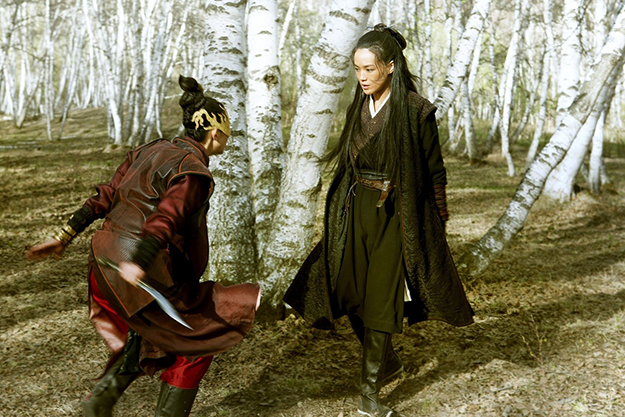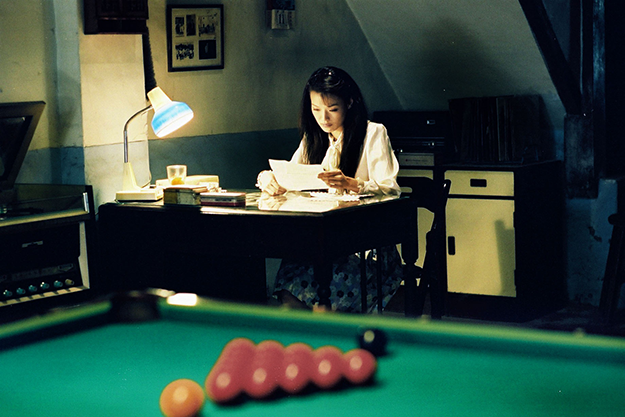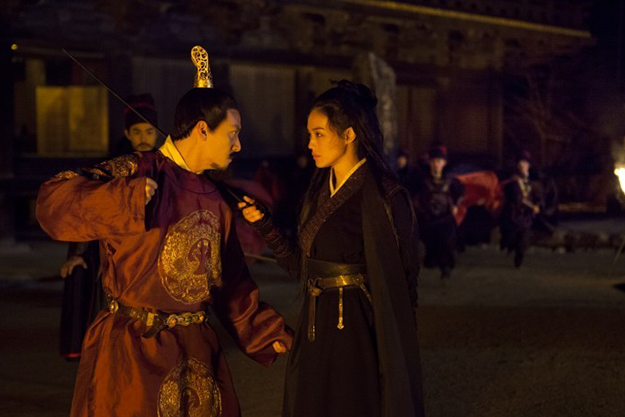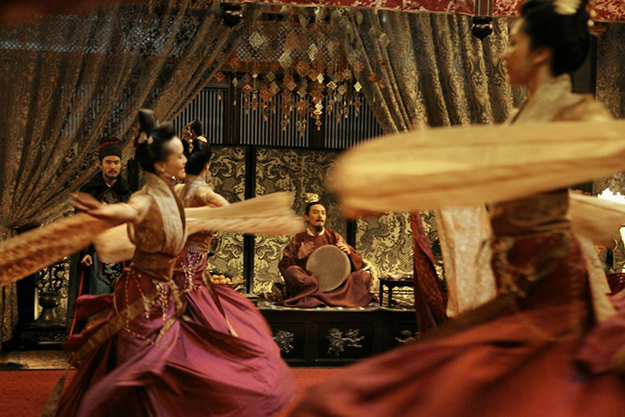Interview: Hou Hsiao-hsien with Shu Qi and Chang Chen
Our September/October cover story about The Assassin features an interview with Hou Hsiao-hsien by Aliza Ma, as well as an excerpt from the below interview by Rubing Liang, conducted in Cannes with Hou and his stars Shu Qi (who plays the assassin, Nie Yinniang) and Chang Chen (her target, Tian Ji’an). For more Hou, read on!

The Assassin
How did you come to the idea of making a film about Nie Yinniang?
Hou: I read the short stories by Pei Xing, known as chuanqi, when I was in college. There are a lot of female characters in the stories—Nie Yinniang is one of my favorites. The Tang Dynasty had the greatest number of chuanqi, with all kinds of different characters. I’ve always wanted to make a film based on them. I read a lot from The New Book of Tang, Old Book of Tang, Zizhi Tongjian, etc. Those were the foundation of the film. Then I have this range for developing the story. Without this foundation, you could easily get lost. A period piece usually spends a long time in pre-production. I was thinking, “I’ll do it when I’m older,” and all of a sudden I’m older already. The actors got mature too—it would be too late if I didn’t decide to make the film now.
The audience expected to see a swordsman (wuxia) film, a genre in which the protagonist helps others and serves the cause of justice. How do you describe the idea of justice in The Assassin?
Hou: In the classic Records of the Grand Historian, a section is devoted to rangers and assassins. Many novels in the later periods (The Assassin is based on a novel of this period) also have assassins as protagonists, but not many of them are considered swordsmen. But what’s the definition of a swordsman? Some act because of their own personalities; others act because they understand that by killing one guy they can save thousands. Their philosophies are different. Swordsman novels came even later as a literary genre, in which the heroes act because they want to serve justice.
This is another amazing collaboration with Lee Ping Bing. Did you shoot in film or digitally, and which way do you prefer?
Hou: We shot it in 35 mm, more than 500,000 feet of film. It was the first time I edited the film digitally: we scanned the film in 4K, and edited in 1K, because that’s how the editing process works. I’m really not into this digital process at all. It’s so complicated, we didn’t have the best editing system to do it, and it just took too long. The same with the color correction process: we had two systems, the first one wouldn’t give me the color I wanted no matter what, and we had to change it. Everything took so long, and costs far more than editing in film, with which we were able to finish much faster. And this is only the beginning, because the system and the equipment have to be upgraded from time to time, which costs you all the money. You think you have a good camera, but that’s only for now. But after all, I have a cinematographer I love to work with—that’s the most important thing. All that matters is the way you look at things and the way you work.
Can you talk about the use of colors—red, black, gold?
Hou: To show exactly how the Tang Dynasty would look like, our art department went to India and South Korea to buy handmade silk products. Suzhou and Hangzhou too. As for the colors, gold is the symbol of royal power. Usually the local governments were not allowed to use it. But at that time, it was the end of the Tang Dynasty, and the provinces mentioned in the film were as powerful as the Court, especially Weibo. The color red, I think, looks the best on silk products. They are my favorite colors, too, so the art department used this as a guide, and they did a great job.
Did the stars ever have to adjust their shooting schedule during production?
Hou: The actresses all got bruises during the shooting of the fight scenes, so they took their time to recover, then rehearse, and then we shot again. None of them are professional action film or kung fu actors—only Sheu Fang-yi, she fit in faster because she’s a modern dancer. She was great in the film, and I’m even considering hiring her as my martial-arts advisor. She knows the human body very well and what was physically possible for the actresses to do in a scene.
[To Shu Qi and Chang Chen] Hou looks gentle, but he is tough inside. Do you think so? Shu Qi used to say she was afraid of him.
Shu: That’s only hearsay [laughs], and it is he who’s afraid of me. But when we were on the red carpet and he walked in front of us, we all looked like his bodyguards. He has the innate presence of not a swordsman but the leader of swordsmen.
Hou: No, I’m a lone swordsman. You know, after Wen Tianxiang of the Golden Horse Awards saw the film, he texted me: “This film is about you! Like the protagonist, you are always alone with no one similar to you.”

Three Times
Chang: You should visit our shoot next time, because it’s always quiet on set, and you can hear the drop of a needle. That’s the power of his presence. It’s because, first, we all respect Hou a great deal, and second, we all know an anecdote about him. One day, when we were shooting Three Times, we saw that his hand was wrapped in bandages. We didn’t dare to ask him what happened, and only heard from someone else later that Hou was upset about a problem in the film, and he punched the door and got hurt. We all know him well, and so we try to pay particular attention to that. He is very persistent, so that we are all able to concentrate on what we should do.
Shu: Most of the time Hou is angry at himself. When we shot Flowers of Shanghai, he was so angry that he kicked the door and had a fracture. A journalist at the time even said Hou had a hot temper.
Hou: That’s not right. I was just impatient.
Shu: But Hou has never been angry with the crew or given them strict demands. Even when a microphone is mistakenly placed, he doesn’t say a word or blame anyone, but rather tries to adjust it himself. He knows what he wants, and being impatient, he doesn’t want to waste time. This spirit motivates all of us to be efficient. You will find us on set working all the time, but we are happy. A little sad sometimes, perhaps. For example, those paintings on the set were drawn by students from the academy of fine arts in Taipei. They worked from morning to night, every day for a few months. All these beautiful screens were drawn by them.
Hou: In the end they were all blocked by the silk curtains.
You combined a swordsman story with your style of long shots perfectly. Can you talk a little bit about that, and did you ever consider the traditional Hong Kong kung fu style, using fast-paced editing?
Hou: There are already so many films with that style, why bother making another one? For me, actually, short shots are more difficult, because that requires more editing work, and the final version could be very different from what you thought it should be. I have been used to long shots since the beginning of my career. But for action scenes, it’s very difficult to shoot in long shots—how long could the actresses actually be fighting? I have no interest in storyboards or anything like that. Instead, I think the actual condition on the day of shooting affects things more.
In my early works I used some nonprofessional actors. Part of the use of long shots is to make them feel more comfortable when acting. Close-ups, short shots, they might not be able to do it. Same thing, for nonprofessionals, in order to capture the most natural reaction, I usually shoot the morning scenes in the morning, the eating scenes during actual lunch time, etc. For the professionals, they are all my longtime collaborators and are very familiar with the way I shoot.
The action scenes are short and fast. Can you talk a bit more about the fight choreography?
Hou: It’s not my style to have fighters flying through the air. That’s not my way. I want to follow the rules of gravity. The most important thing is to be close to reality. The assassins used short knives, so it’s more like close fighting. So in this case, we need professional fight choreographers to design every scene, and a long rehearsal period was required for the actors. Another important thing was the facial expressions. As assassins and fighters, they could not have any facial expression when fighting—it may exaggerate the whole scene.
Some people said they were impressed by the look of the film, but didn’t quite get the story.
Hou: That’s normal, and it can’t be helped. Hollywood-style films are popular all around the world nowadays, and they need a strict story structure. If the story is not told that way, not continuous enough, the audience will have difficulty following along. But that’s only one of the many ways of telling a story: there are hugely different ways of filmmaking in world cinema. Only because of the huge impact of Hollywood, young people want to imitate that style. Actually, almost all filmmakers want to imitate the style of Hollywood. But I don’t see it that way. A good film is when you continue your imagination [of it] after seeing it.

The Assassin
In one scene, Nie Yinniang fights another lady assassin with a golden mask. That character appears twice. Can you tell us who she really is? The credit shows she was played by Zhou Yun, who also plays Tian’s wife. What’s the relationship between the wife and this lady assassin?
Hou: The character’s name is Jing Jing’er. She and Kong Kong’er, the wizard with the white beard, were kung fu masters in the original story. But Jing and the wife were two different characters in the story. In the film, I wanted to show the fact that the Yuan family married their daughter to the Tian family in order to seize power in Weibo, so the wife was actually a matchless assassin too. Only when something happened, when she felt any threat, she would put on her mask and become an assassin. So in the film, the wife is the lady assassin. Actually, Tian knew about this, too—just nobody talked about it.
I feel that the actors and actresses are like your props, and that you are the brightest star of the film.
Hou: What is performance? You have seen too many Hollywood movies if you expect the performers to show their actions and emotions clearly. But why should there be only one type of performance? It’s true that my actors and actresses stand at a distance from the camera so that their movements are not always clear to the audience. But I hope such distance can make you think more, even after the on-screen actions are over.
The style of the film depends on the filmmaker’s personality. I went to film school after military service because I loved watching movies when I was small. I found a book at the school library called Film Director. I read the preface—a very long one—and in the end it says: “Even after you understand everything in this book, you are still not able to direct.” And I thought: so what’s the point of reading it? So I returned the book. In my sophomore year I had a teacher who just finished studying abroad in Japan and taught us practical stuff. But once I looked through the camera, I realized that what he taught was useless to me, because everything was clear in front of my eyes, and I would never make a mistake. I’m not a steadfast person, but I always make sure I do what I think should be done.
On my set, once the script and camera are there, everything is ready. I don’t do rehearsals. Once the actors walk naturally into the scene, my job is to simply let the camera follow them. I don’t like to impose things; people are different, and I don’t force them to act in my way. Also, some directors pay a lot of attention to drama and structure. I’m not one of them.
What about the music in the film?
Hou: The original soundtrack is produced by Lim Giong. He’s been collaborating with me since Goodbye South, Goodbye. I cast him as an actor in Goodbye South, and that was the third time he acted in my films: before that there were The Puppetmaster and Good Men, Good Women. He is a musician. I went to his show once, and he had such wildness on stage—that’s why I cast him. But he is very shy in person, like my son. Then I found out that, because he is an artist too, he has a different and more complicated vision in seeing things during the shooting—he couldn’t be 100 percent committed to a role. Instead, I asked him to write the music for my films. For Goodbye South, he finished everything in only one month, and the score was very well received in Europe. For The Assassin, he just looked at the film and knew what I wanted.
As for the music at the end, my assistant director, Yao Hongyi, and I sat down and tried different pieces. That one was found by him. It’s actually a well-known piece in Europe from five or six years ago—a piece of percussion music written by an African musician, and he played it with a French orchestra. I fell for it immediately, and also it’s not expensive to get. There was another piece by a German musician which was too expensive so I had to give it up.

The Assassin
Have you considered how The Assassin will be received at the box office when it opens?
Hou: I’ve been making films for so many years now. There’s one thing I always believe: when you are in the moment of creating art, the audiences are not there. Most of the filmmakers will have to face this problem that if you don’t make a film for the audience, the way in front of you will become tougher. It costs a lot of money to make a film, and if it’s not doing well enough in box office, it’s very possible that you won’t be able to make any more films. This one, The Assassin, cost almost 90 million yuan [$14 million]. If it were not me, I don’t think anyone else could do it this way. I’m no different—I could have difficulty getting money in the future too. But I always try to find a way to make it even without enough money: I collaborate with my friends, people I know well, like Shu Qi. She will be part of my film for nothing.
Can you talk about your next project? Is it an adaptation of Hsieh Hai-meng’s award-winning novel Shulan River?
Hou: Yes, it’s a movie about a river goddess set in the modern era. Taipei used to be in a basin with a lot of waterways, and aboriginal tribes lived along them. The waterways were used for paddy irrigation, but many of them have since been covered over by roads as a result of urbanization. They are all underground now. Many of the streets in Taipei are named after the old waterways. I thought, if there were a river goddess, she would be very lonely, feeling sad about this situation. I’m interested in this project because a lot of Taipeinese have lived in Taipei so long but they never got the chance to know about this. Xie told me about this idea before she wrote the novel. Now that the novel is there, I’ll choose some parts from it and adapt them into a film.



